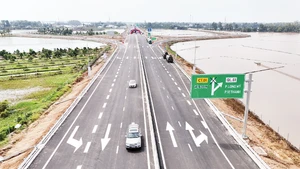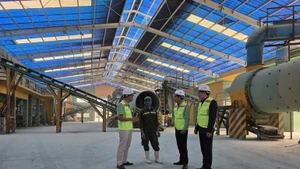To achieve the goal of having the digital economy account for 40% of the city’s economic output by 2030, the participation of the government, businesses, and citizens is essential.
Promoting the digital economy with practical solutions was the focus of the recent “People Ask - Government Answers” programme organised by the Ho Chi Minh City People's Council in May.
According to Vo Minh Thanh, Deputy Director of the Ho Chi Minh City Department of Science and Technology, the city began preparing and implementing digital transformation as early as 2020 by launching a digital transformation programme.
This included a set of initiatives centred around digital government, digital economy, and digital society, as well as the establishment of a steering committee for digital transformation.
He emphasised that the digital economy is a strategic path to boost labour productivity, enhance business competitiveness and quality, and contribute to the city’s socio-economic development.
Despite positive progress, the implementation of policies in this field has yet to meet expectations, hindered by the lack of a comprehensive legal framework for fast and sustainable development. Notably, there remains a shortage of high-quality human resources in advanced technology sectors, compounded by obstacles in financial mechanisms for science and technology.
Sharing his perspective, Nguyen Ky Phung, Head of the Management Board of the Saigon High-Tech Park, stated that developing the digital economy requires the involvement of the government, businesses, and the public.
The government plays a crucial role in building institutions and policies, investing in digital infrastructure, and creating a favourable business environment to attract investment, drive the development of the digital economy, promote digital transformation within public institutions, and develop digital human resources.
Meanwhile, businesses and citizens must improve digital awareness and skills, change consumption and working habits. In particular, businesses need to innovate, actively apply digital technologies in production and business, and create new products, services, and solutions.
To further advance the digital economy, Ho Chi Minh City Vice Chairwoman Tran Thi Dieu Thuy affirmed that the city will continue refining its institutional frameworks, mechanisms, and policies. Special emphasis will be placed on developing preferential and tailor-made mechanisms for scientific research and innovation, while encouraging the establishment of innovation hubs and open laboratories.
At the same time, the city will strongly develop digital infrastructure and data systems by investing in cloud computing and ensuring information security to build public trust in the digital economy. Efforts will also include developing shared and open databases, and enhancing data connectivity between agencies.
In addition, the city will focus on developing high-quality human resources, especially in the semiconductor and strategic technology sectors, including early training at the secondary school level. Support for businesses to adopt digital technologies, promote e-commerce, foster an innovative start-up ecosystem, and attract high-tech enterprises will be clearly prioritised.
The city also aims to strengthen international cooperation, leveraging Resolution 57 and recently issued policies and laws to promptly support enterprises engaged in the digital economy and digital transformation, enabling them to grow further in the future.
On the part of businesses and citizens, the application of digital transformation in production and business activities is also accelerating amid changing market dynamics.
Hoa, owner of the seafood restaurant Hoa Doc Let (located on Vuon Lai Street, An Phu Dong Ward, District 12), shared that previously, his staff had to take orders on paper and pass them to the kitchen. During busy hours, this often led to confusion, incorrect orders, and mix-ups between tables.
Now, by using the KiotViet sales management software, orders can be taken at the table and sent directly to the kitchen in just seconds via a mobile phone, offering a highly convenient and efficient solution. The system also tracks table numbers and updates dish status, helping to avoid errors and maintain proper order.
“Digital transformation used to sound like something distant—technology that ordinary people like us could hardly reach—but once I started using it, I realised it’s actually very accessible and brings lots of benefits,” Hoa noted.
At traditional markets, where cash used to be the only mode of payment, cashless transactions are no longer unfamiliar to traders.
Yen, owner of the Hoang Yen fruit stall (at Can Cu 26 Market, Go Vap District), said that after the Covid-19 pandemic, bank transfers became more common, so she adopted QR code payments to meet customer demand and facilitate sales.
Previously, with a large and varied inventory, she relied on traditional methods of management, making it difficult to keep track of stock, often having to estimate what was left or sold out, and manually recording daily profits and losses, frequently resulting in errors and poor tracking.
Now, thanks to technology, she can manage her entire shop with just a smartphone, always knowing her exact stock levels and identifying best-selling products in real time for timely restocking.
As the country’s economic engine, Ho Chi Minh City must implement timely and effective measures for the digital economy to thrive. If the government adopts practical, well-tailored policies and each citizen proactively shifts their mindset instead of standing on the sidelines, the city is fully capable of reaching or even exceeding its target of having the digital economy account for 40% of its economic output by 2030.
















